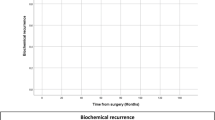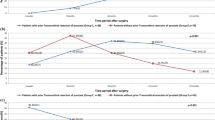Abstract
Purpose
To explore whether patients undergoing radical prostatectomy at a German Cancer Society (DKG: Deutsche Krebsgesellschaft) certified center (CC) have superior functional and surgical outcomes compared to patients undergoing radical prostatectomy at a non-certified hospital (nCC).
Methods
A retrospective cohort of 22,649 patients treated between 2008 and 2017 and subsequently recovered at two rehabilitation clinics within 35 days of surgery were analyzed. Urine loss (24 h-pad-test), margin status, and nerve-sparing status at rehab admission were compared between CC and nCC patients, adjusting for age, histopathology (pT, pN, Gleason score), metastases (cM), Karnofsky performance status, time from surgery to rehabilitation, and insurance provider (statutory vs. private).
Results
Thirty-four percent of patients underwent surgery at a CC. Complete continence is more pronounced in patients treated in CC (16.6% vs. 24.4%, p < 0.001). In the adjusted models, incontinent patients from CC had less urine loss compared to patients from nCC (− 27.41% difference; 95% CI − 31.71% to − 22.84%, p < 0.001). CC patients were less likely to have positive resection margins (adjusted OR 0.71; 95% CI 0.66 to 0.76, p < 0.001) and more likely to have had a nerve-sparing procedure (adjusted OR 1.29; 95% CI 1.21 to 1.38, p < 0.001).
Conclusion
Patients treated at certified centers presented to rehab with better urinary continence, higher nerve-sparing rates, and lower positive-margin rates. These results imply superior care at DKG certified centers.
Similar content being viewed by others
Abbreviations
- DKG:
-
German Cancer Society
- CC:
-
Certified center
- nCC:
-
Non-certified center
- RP:
-
Radical prostatectomy
References
Sant M, Capocaccia R, Verdecchia A et al (1998) Survival of women with breast cancer in Europe: variation with age, year of diagnosis and country. Int J Cancer 77:679–683. https://doi.org/10.1002/(SICI)1097-0215(19980831)77:5%3c679:AID-IJC3%3e3.0.CO;2-S
Kowalski C, Ferencz J, Brucker SY et al (2015) Quality of care in breast cancer centers: results of benchmarking by the German Cancer Society and German Society for Breast Diseases. Breast 24:118–123. https://doi.org/10.1016/j.breast.2014.11.014
Kowalski C, Ferencz J, Albers P et al (2016) Quality assessment in prostate cancer centers certified by the German Cancer Society. World J Urol 34:665–672. https://doi.org/10.1007/s00345-015-1688-z
Burchardt M, Fichtner J (2019) Catalogue of requirements for prostate cancer centers 2020. 44, online at https://www.krebsgesellschaft.de/zertdokumente.html?file=files/dkg/deutsche-krebsgesellschaft/content/pdf/Zertifizierung/Erhebungs-und-Kennzahlenboegen/eb_pz-K1_190910.docx&cid=16519
OncoMap. https://www.oncomap.de/centers?selectedOrgan=Prostata. Accessed 7 Apr 2020
Trautmann F, Reißfelder C, Pecqueux M et al (2018) Evidence-based quality standards improve prognosis in colon cancer care. Eur J Surg Oncol 44:1324–1330. https://doi.org/10.1016/j.ejso.2018.05.013
Völkel V, Draeger T, Gerken M et al (2018) Long-term survival of patients with colon and rectum carcinomas: is there a difference between cancer centers. Gesundheitswesen. https://doi.org/10.1055/a-0591-3827
Groeben C, Koch R, Baunacke M et al (2017) High volume is the key for improving in-hospital outcomes after radical prostatectomy: a total population analysis in Germany from 2006 to 2013. World J Urol 35:1045–1053. https://doi.org/10.1007/s00345-016-1982-4
Kranz J, Deserno O, Fischer K et al (2014) Radical prostatectomy in a certified prostate cancer center: medical treatment and outcome. Urologe 53:1350–1357. https://doi.org/10.1007/s00120-014-3604-3
Evans SM, Millar JL, Moore CM et al (2017) Cohort profile: the TrueNTH Global Registry—an international registry to monitor and improve localized prostate cancer health outcomes. BMJ Open 7:1–8. https://doi.org/10.1136/bmjopen-2017-017006
Roth R, Dieng S, Oesterle A et al (2020) Determinants of self-reported functional status (EPIC-26) in prostate cancer patients prior to treatment. World J Urol. https://doi.org/10.1007/s00345-020-03097-z
Wirth M, Fossati N, Albers P et al (2019) The European prostate cancer centres of excellence: a novel proposal from the European Association of Urology prostate cancer centre consensus meeting. Eur Urol 76:179–186. https://doi.org/10.1016/j.eururo.2019.01.033
D’Ancona C, Haylen B, Oelke M et al (2019) The International Continence Society (ICS) report on the terminology for adult male lower urinary tract and pelvic floor symptoms and dysfunction. Neurourol Urodyn 38:433–477. https://doi.org/10.1002/nau.23897
Arsov C, Albers P (2009) Prostate cancer centres/prostate centres—certified by DKG or DVPZ. Tumor Diagn Ther 30:148–151. https://doi.org/10.1055/s-0028-1109487
Vickers AJ, Bianco FJ, Serio AM et al (2007) The surgical learning curve for prostate cancer control after radical prostatectomy. J Natl Cancer Inst. https://doi.org/10.1093/jnci/djm060
Steffens JA, Ting O, Schmidt S, Albers P (2010) Certified prostate cancer centers of the German Cancer Society. Urologe 49:910–915. https://doi.org/10.1007/s00120-010-2301-0
Cooperberg MR, Master VA, Carroll PR (2003) Health-related quality of life significance of single pad urinary incontinence following radical prostatectomy. J Urol 170:512–515. https://doi.org/10.1097/01.ju.0000074941.27370.c4
Stothers L, Thom D, Calhoun E (2005) Urologic diseases in America project: urinary incontinence in males—demographics and economic burden. J Urol 173:1302–1308. https://doi.org/10.1097/01.ju.0000155503.12545.4e
Funding
This research did not receive any specific grant from funding agencies in the public, commercial, or not-for-profit sectors.
Author information
Authors and Affiliations
Contributions
MCB-B contributed to protocol and project development, data collection or management, data analysis, and manuscript writing and editing. GM contributed to data collection or management, data analysis, and manuscript writing and editing. DP contributed to writing and manuscript editing. EK contributed to data collection, protocol and project development. UO contributed to protocol and project development and manuscript editing.
Corresponding author
Ethics declarations
Conflict of interest
All authors declare no conflict of interest.
Animal and human rights
Not applicable, i.e., the study involves no human participants, personal data, or human tissue but only aggregated quality information.
Ethical standards
All patients gave their informed consent prior to data collection. The study has been performed in accordance with the ethical standards laid down in the 1964 Declaration of Helsinki and its later amendments. The present study involves no human participants, personal data, or human tissue but only aggregated quality information.
Additional information
Publisher's Note
Springer Nature remains neutral with regard to jurisdictional claims in published maps and institutional affiliations.
Rights and permissions
About this article
Cite this article
Butea-Bocu, M.C., Müller, G., Pucheril, D. et al. Is there a clinical benefit from prostate cancer center certification? An evaluation of functional and oncologic outcomes from 22,649 radical prostatectomy patients. World J Urol 39, 5–10 (2021). https://doi.org/10.1007/s00345-020-03411-9
Received:
Accepted:
Published:
Issue Date:
DOI: https://doi.org/10.1007/s00345-020-03411-9




